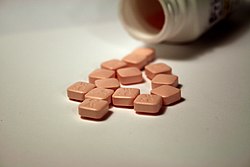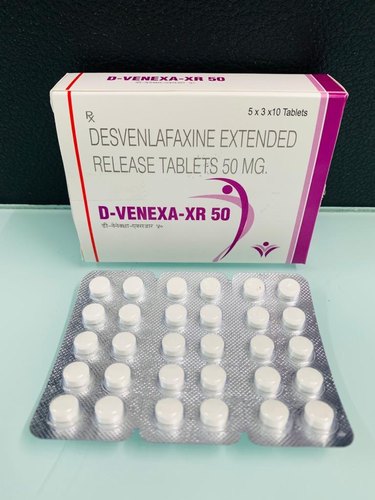Depression is a serious mental illness that can impact every area of your life. Thankfully, there are treatments available that can help you manage your symptoms. One such medication is desvenlafaxine (Pristiq), a drug that is used to treat depression. In this blog post, we will discuss the uses, side effects, and dosage of desvenlafaxine. We will also provide tips for how to best manage your depression.
Contents
What Is Desvenlafaxine?

Desvenlafaxine is a medication that is used to treat depression. It is in a class of drugs known as serotonin-norepinephrine reuptake inhibitors (SNRIs). SNRIs work by increasing the levels of serotonin and norepinephrine in the brain. These are two chemicals that are known to impact mood. By increasing the levels of these chemicals, SNRIs can also help to improve mood and relieve symptoms of depression.
How Does Desvenlafaxine Work?
Desvenlafaxine works by increasing the levels of serotonin and norepinephrine in the brain. These are two chemicals responsible for impacting mood. It works by helping to restore the balance of certain natural substances (serotonin and norepinephrine) in the brain. By increasing the levels of these chemicals, desvenlafaxine can further help to improve mood and relieve symptoms of depression.
Intake
Desvenlafaxine is available as an oral tablet. It is typically taken once daily, with or without food. The tablets should be swallowed whole. Do not chew, crush or break the tablet. Store it at an ideal temperature of around 20°C and 25°C. It should also be kept in an air-tight and secure container.
Dosage
Desvenlafaxine is available in the form of an oral extend-release tablet. This comes in 25mg, 50mg, as well as 100mg concentrations. For an average adult, the maximum recommended amount is 50mg/day.
Benefits Of Desvenlafaxine
Desvenlafaxine is FDA-approved for the treatment of the major depressive disorder (MDD). MDD is a type of depression that characterizes by persistent low mood, loss of interest in activities, changes in appetite or weight, sleep disturbances, fatigue, and feelings of worthlessness or guilt. Desvenlafaxine also has uses in “off-label” treatment of other conditions, such as anxiety disorders, obsessive-compulsive disorder (OCD), and post-traumatic stress disorder (PTSD).
Side Effects

Just like any other medication, Desvenlafaxine also has common physiological/psychological side effects such as:
- nausea
- dry mouth
- constipation
- blurry vision
- decreased sex drive
- sleep problems
- tiredness
- increase in blood pressure
- uncontrollable shaking
However, some serious consequences may include things such as:
- increased risk of serotonin syndrome
- rashes/swelling
- seizures
- nosebleeds
- fainting
- increased heartbeat
- difficulty in concentrating
Immediate medical attention by your doctor is essential in these cases. Ignoring these can prove to be fatal in severe cases.
Alternatives For Desvenlafaxine

SNRI drugs like Desvenlafaxine may help in the time of an acute crisis. However, it can have unwarranted side effects and issues with drug tolerance. Therefore, it is essential to weigh all the pros and cons before starting this medication. Some natural alternatives that help with depression are:
- Exercise- It has been scientifically proven that exercise can be as effective as antidepressants in treating mild to moderate depression. It also has the added benefit of improving overall physical health.
- Diet- Eating a healthy diet can also help improve symptoms of depression. Foods that are rich in omega-three fatty acids, such as salmon, are particularly helpful.
- Supplements– Many supplements are effective in treating depression. These include omega-three fatty acids, magnesium, probiotics, and also vitamin D.
- Talk Therapy- Talk therapy is a type of psychotherapy that can be very helpful in treating depression. It can further help people to understand and work through their emotions.
Other medications used for depression treatment include selective serotonin reuptake inhibitors (SSRIs), such as :
- Citalopram (Celexa)
- Escitalopram oxalate (Lexapro)
- Fluoxetine (Prozac)
- Fluvoxamine (Luvox)
- Paroxetine HRI (Paxil)
- Sertraline (Zoloft).
General Warnings
Although your doctor will inform you about the precautionary measures in the context of your medical background, symptoms, and reaction to the medication, it is important to know some general warnings before considering this medication for treatment.
- This drug is not safe for children under the age of 18.
- Tell your doctor if you are taking a monoamine oxidase (MAO) inhibitor, such as isocarboxazid (Marplan), linezolid (Zyvox), methylene blue, phenelzine (Nardil), selegiline (Emsam, Zelapar), and tranylcypromine (Parnate).
- Do not take Desvenlafaxine if you are also consuming venlafaxine (Effexor) as they are both very similar.
- Avoid the consumption of alcohol during this medication.
- People with kidney/liver problems, glaucoma, seizures, or high blood pressure should practice precautions with the information of their respective doctor.
- Pregnant women should avoid this drug.
- Do not store the medication inside places with moist/humid surroundings, such as the bathroom.
- Older adults above the age of 65 are prone to developing serious side effects. It is essential to keep them in consideration.
- Do not undertake any activities which require alertness, since the medication impairs your reactions.
- In the event of missing a dose, do not intake two doses at once.
- Inform your doctor about consuming Desvenlafaxine if undergoing surgery.
Conclusion
Desvenlafaxine, also known by its brand name Pristiq, is a prescription medication that belongs to a class of drugs called serotonin-norepinephrine reuptake inhibitors (SNRIs). These drugs work by preventing the reabsorption of serotonin and norepinephrine in the brain, which is ideal for the treatment of major depressive disorder in adults. This action helps to keep these neurotransmitters active, which altogether leads to improved mood and symptom relief. It is important to consult a licensed practitioner for a legal and appropriate prescription and further have an effective plan of treatment.
A Word From Therapy Mantra
Your mental health — Your psychological, emotional, and social well-being — has an impact on every aspect of your life. Positive mental health essentially allows you to effectively deal with life’s everyday challenges.
At TherapyMantra, we have a team of therapists who provide affordable online therapy to assist you with issues such as depression, anxiety, stress, workplace Issues, addiction, relationship, OCD, LGBTQ, and PTSD. You can book a free therapy or download our free Android or iOS app.


